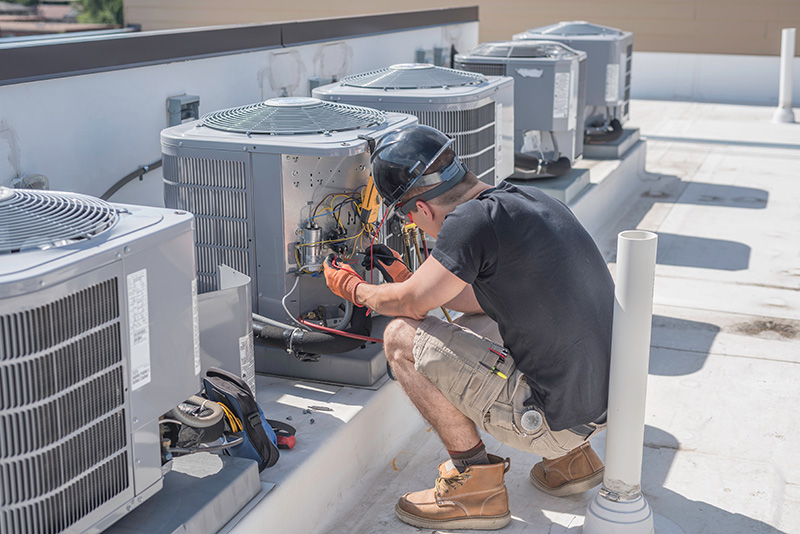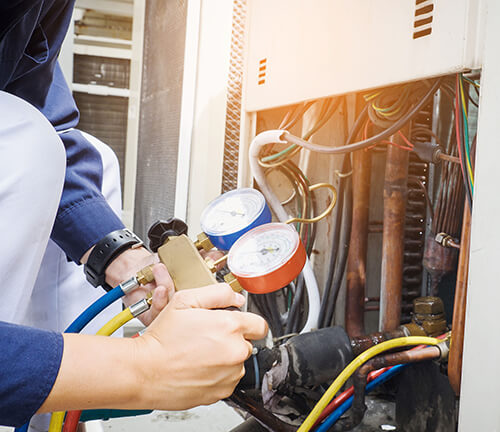Cooling Solutions You Can Rely On by DMAKS HVAC Professionals.
Cooling Solutions You Can Rely On by DMAKS HVAC Professionals.
Blog Article
How to Pick the Right HVAC System for Your Requirements
Selecting the ideal a/c system is a critical choice that needs careful factor to consider of numerous aspects. Begin by evaluating your home's size, format, and unique needs, as these elements dictate the essential capability and setup of the system. In addition, establishing a spending plan that encompasses installation and long-term functional costs is necessary. As you evaluate your options, understanding energy performance rankings and the implications of your regional climate will play a significant duty in your choice. Nevertheless, the myriad of system types available can complicate this process, leading one to question which course inevitably results in optimum convenience and performance.
Evaluate Your Home Dimension
Analyzing your home dimension is a vital primary step in choosing the ideal heating and cooling system. The dimension of your home straight affects the cooling and heating capability needed for reliable climate control. An a/c system that is too tiny will battle to preserve comfortable temperature levels, resulting in increased energy intake and endure the device. On the other hand, an extra-large system can lead to short cycling, insufficient humidity control, and ineffective operation.
To precisely examine your home size, measure the square footage of each room, considering factors such as ceiling elevation and the format. Furthermore, think about the insulation quality and the variety of home windows, as these aspects affect thermal performance. Residences with open flooring plans might need different system configurations contrasted to those with lots of divided rooms.
Making Use Of the Handbook J load estimation technique can provide an extra exact estimate of your HVAC requires. This method make up different factors, consisting of local environment, solar gain, and occupancy patterns. By carefully examining these aspects, you can make certain that your selected heating and cooling system is properly sized, bring about enhanced convenience, power efficiency, and durability of the equipment.
Determine Your Budget Plan
Determining your budget plan is a pivotal action in the heating and cooling system option process, as it sets the criteria for your choices - DMAKS HVAC. A cooling and heating system is a considerable financial investment, and understanding your monetary limits will assist narrow down choices that fit within your methods
Begin by assessing not only the first purchase price however additionally installation expenses, which can differ considerably depending upon the intricacy of the task. Moreover, think about continuous expenditures such as maintenance, repair work, and energy intake. A system may appear inexpensive at first yet can bring about higher costs in time if it is much less effective.
It is suggested to allot a contingency fund for unexpected costs that may develop throughout installation or initial system modifications (DMAKS HVAC). Furthermore, discover funding alternatives or rebates that may be available, as these can relieve the concern of upfront costs
Eventually, having a clear budget plan allows you to involve with heating and cooling professionals a lot more efficiently, guaranteeing you get customized guidance that aligns with your monetary objectives and home requirements. By being diligent regarding your budget, you can make educated decisions that improve convenience without jeopardizing economic stability.
Evaluate Power Efficiency
Power performance plays an important duty in the overall efficiency and cost-effectiveness of your HVAC system. When choosing a system, it is important to consider its energy performance ratings, as these figures straight impact your utility expenses and ecological footprint. Try to find systems with a high Seasonal Power Efficiency Proportion (SEER) for cooling down and a high Yearly Fuel Application Efficiency (AFUE) score for home heating. Greater scores indicate greater efficiency, implying even more convenience for much less energy consumption.
In addition, consider the Energy Star certification, which represents that the system satisfies rigid performance standards established by the Environmental Protection Agency. Investing in a Power Star-rated a/c system can cause significant financial savings with time, specifically in locations with severe temperature level variations.
An additional aspect to examine is the system's dimension and capability. A large or undersized unit can lead to inadequacy and raised power expenses. DMAKS HVAC. Appropriate sizing, commonly figured out with a Manual J load estimation, makes sure that the system operates at optimal efficiency


Take Into Consideration Environment and Setting
When selecting a heating and cooling system, it is vital to take into consideration the click here to find out more neighborhood environment and ecological problems, as these factors significantly influence the system's performance and efficiency. Different regions experience differing temperature level extremes, moisture degrees, and seasonal adjustments, every one of which effect heating and cooling demands.

Moreover, regional environmental aspects, such as air quality and prospective irritants, should notify your choice. Solutions outfitted with advanced filtering modern technologies can help alleviate toxins and offer cleaner air. Additionally, consider the power sources available in your location-- some heating and cooling systems are a lot more efficient when powered by gas or renewable resource resources.
Inevitably, aligning your heating and cooling system choice with your neighborhood environment and ecological considerations will result in improved convenience, boosted performance, and reduced power costs.
Explore System Types and Features
As property owners seek to enhance convenience and effectiveness, discovering the numerous kinds of cooling and heating systems and their one-of-a-kind features becomes important. The primary sorts of heating and cooling systems include central air conditioning, heatpump, ductless mini-split systems, and furnaces. Each system supplies unique advantages tailored to various demands and choices.
Air conditioning systems give consistent air conditioning throughout a home, making them optimal for larger spaces. Heatpump function as both home heating and cooling down options, using electrical energy to transfer heat, which can result in reduced power expenses. Ductless mini-split systems are becoming increasingly preferred because of their versatility and ease of installation, permitting house owners to manage the temperature in specific spaces without comprehensive ductwork.

Verdict
Finally, selecting the suitable a/c system demands mindful factor to consider of numerous factors, including a fantastic read home size, budget constraints, energy efficiency, regional climate, and offered system types. An extensive analysis of these components makes sure optimum convenience and cost-effectiveness. By complying with an organized technique, house owners can make educated decisions that line up with their particular needs and preferences, ultimately leading to boosted interior air high quality and energy savings.
Report this page